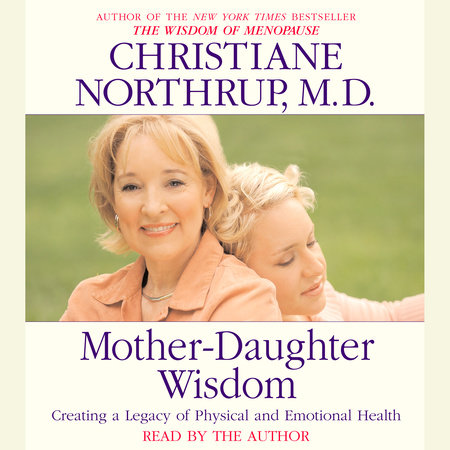Mother-Daughter Wisdom Reader’s Guide
By Christiane Northrup, M.D.


1. Mother-Daughter Wisdom includes Dr. Northrup’s candid recollections of her own journey to motherhood, and her realizations about her mother. What are the legacies of motherhood in your family? If you have limited information about this, what are your greatest obstacles in discovering that history?
2. What new insights regarding conception, pregnancy, labor, and birth did you take away from the book’s initial chapters? Why might Western medicine get in the way of the natural processes that ease childbearing?
3. Chapter two features “The Five Facets of Feminine Power,” ranging from the basics of physical care to the discovery of passion and purpose in life. Which of these facets shines brightest in your life these days? Which facet would you most like to “polish”?
4. Using Dr. Northrup’s analogy of life as a house, discuss the times when you moved from one “room” to another in your role as mother, daughter, or both.
5. In your opinion, is the mother-daughter legacy primarily a matter of nature or nurture? What medical legacies have been passed down to you by your ancestors? How much can genetic predispositions be modified by our own actions? Do you agree with Dr.Northrup’s assessment of the role we can play in creating physical and emotional health for ourselves?
6. In Chapter one, the author states “the only way to raise a healthy, proud daughter or heal our own relationship with our mothers, is to enter bear territory. If you are raising a daughter, you must be willing to open yourself to the place inside where you would willingly sacrifice your own life or that of someone or something else for your daughter. It also means that you must know when to stop the sacrifice for her sake as well as your own.” When have you experienced Mother Bear energy, either as the bear or as her cub?
7. Chapter seven discusses the “emotional” versus “executive” portions of the brain and the balance between self-love and empathy. In what ways have you experienced these tensions in your day-to-day experience? Does the distinction between “shame donors” and “shame recipients” resonate with you? What strategies, if any, have you adopted to reverse feelings of shame?
8. Chapter eight defines nourishment not only in terms of sound nutrition but as a whole-life experience. How do the concepts featured in this chapter create a foundation for the subsequent chapters? What are the keys to a “well-nourished” life, even in financial terms?
9. How do gender lines factor into the creation of “love maps” (Chapter ten)? How does American culture encode seemingly contradictory expectations for boys and girls regarding relationships and sexuality?
10. Who were some of your earliest idols and heroes? Can you think of any experiences from your own life that reflect Dr. Northrup’s statement, in Chapter twelve, that “through her idols, [a school-age girl] explores ways of being in the world and experiments with her ideal self” and that “the qualities a girl admires in others are really inside herself?”
11. Chapter twelve, “The Anatomy of Self-Esteem,” eloquently describes ways to instill confidence and help your daughters develop an inner guidance system. Through what means were you taught how to navigate harmful situations? To what degree do you currently “feel safe on the earth”?
12. What contemporary knowledge, from nutrition to relationships, has had the greatest impact on your health? How proactive are you in your relationships with your health-care providers? Do you keep yourself informed about medical issues that concern you, ask questions of your doctors, get second opinions when you think they are appropriate?
13. In Chapter fifteen, the author states that during puberty a young woman’s “unique, inborn gifts and talents are ripe for in-depth recognition and development” and that “the degree to which [she] is supported to become who [she] really is by [her family] and social networks is the degree to which [she] will bloom [and] remain healthy.” How did your family respond to or address puberty in your home? How did it affect the woman you became? Do you feel that our society would benefit from more positive coming-of-age rites, and have you personally participated in any?
14. How would you describe the relationships between women and men in your family? Did your mother defer to your father, or take on all the responsibility for the emotional well being of her family? How has your parents’ relationship influenced your own feelings about what you can expect from men?
15. Is the twenty-first century an exceptionally dangerous time to be an adolescent girl, due to high rates of substance abuse and unprotected sex? Or are we raising a generation of young women who possess an exceptional ability to take care of themselves? How do you think they will characterize our current generation of mothers?
16. What message would you most like to hear from your mother? From your daughter? What is the most healing message you could give to your mother? Your daughter?
Just for joining you’ll get personalized recommendations on your dashboard daily and features only for members.
Find Out More Join Now Sign In